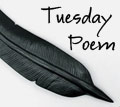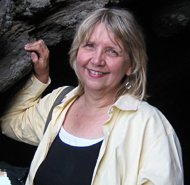The Tuesday Poem: Refeaturing Nancy Mattson — “Compasses: A Triptych”
Compasses: A Triptych
1.
Blake drew Newton naked, every muscle
tense, seated on a rock, hunched over
the paper world unscrolling at his feet,
inscribing limits with his compasses
like God in Milton’s paradise.
2.
Rodchenko photographs his wife,
Stepanova, working at her table,
a pair of compasses in one hand,
thumb and forefinger twirling the pivot,
eyes intent on the interlocking spheres
of her textile design. The universe
is new from skin to sky. Hand-rolled,
a cigarette rests on her bottom lip.
The ash drops, she smiles and blows it away.
Seed fluff, time flake, off to the past.
This is no lady painter of aquarelles,
she’s a maid’s daughter, Varvara Stepanova,
calls herself ‘Varst’ and she can do anything:
boil pitch or potatoes, build sets for plays,
shoot billiards, dance tangos, make zaum
poems in syllables, grunts and blobs of paint.
Varst is sewing canvas overalls,
her fingertips tough as thimbles. Bites the needle,
spits a smoke ring through its eye, pulls
a thread into a V, cuts and knots it.
Varst sneers at fine art,
slaps the heads off chrysanthemums,
uses her brain like a weapon, wages war
on the object, publishes manifestos, critiques
all ‘isms’ and the artists who deliver them,
writes in her journal with a steel nib,
nails their quirks and egos.
Rodchenko snaps the circle in groups, pairs
and singles, but his wife is his favourite
subject. Never object. She gazes away
from the lens as she points a blade,
arm-length, at six of her collages.
Her self-portrait mocks the easel: forehead
a cross-hatch in blue paint, mouth a scowl
of black X’s. She caricatures herself,
her husband too, as clowns
with elbows and pantaloons.
3.
Never since John Donne has it been so true
as it is with this pair who stride
with equal steps into the Revolution:
If they be two, they are two so
as stiff twin compasses are two.
© Nancy Mattson
About the Poem:
I am still engaged in the process of re-posting poets who have had multiple poems featured on “…Anything, Really” , or by me on the Tuesday Poem Hub, since I joined the Tuesday Poem community in June 2010.
Today I am delighted to feature Nancy Mattson’s Compasses: A Triptych, that I featured on the Hub on October 12, 2010. At the time, Nancy provided the following note:
About The Poet:
Nancy Mattson is an ex-patriate Canadian poet, now resident in London. Her third collection of poetry, Finns and Amazons, of which Compasses: A Triptych forms part, was published by Arrowhead Press, in 2012.Nancy began writing poetry in 1977 after completing her MA in English Literature at the University of Alberta. Her poetry, non-fiction and reviews have been published in Canada, the US, the UK, Ireland and Finland in magazines, anthologies, the odd scholarly journal, a printed encyclopaedia and a couple of parish newsletters.
In 1982 she edited and co-authored a history book which provided the inspiration for her first collection, Maria Breaks Her Silence (Regina: Coteau, 1989), based on the life of a 19th century Finnish woman who emigrated to Canada. This was shortlisted for the Gerald Lampert Memorial Award for best first book of poetry in Canada. Adapted for the stage as Lye Soap and Dancing Cows, it was also broadcast on CBC Radio.
Nancy’s second full collection was Writing with Mercury (Hexham: Flambard, 2006), with cover art by Elaine Kowalsky. Nancy is also one of five poets featured in the anthology, Take Five 06, edited by John Lucas (Nottingham: Shoestring, 2006). The poems in these two volumes are set in contemporary England, Canada, Finland and Italy and use memory, myth, history and family stories to create a rich linguistic and cultural texture.
Nancy was also pleased to be one of 20 writers selected by Dr. Beth L. Virtanen to appear in Finnish North American Literature in English: A Concise Anthology (Edwin Mellen Press, 2009) and her work has appeared in many other anthologies.
.
.
 To read the featured poem on the Tuesday Poem Hub and other great poems from fellow Tuesday poets from around the world, click here.
To read the featured poem on the Tuesday Poem Hub and other great poems from fellow Tuesday poets from around the world, click here.








So much detail in that poem; it calls for several readings. Linking these diverse figures through the compass is surprising and so effective.
Thanks for (re)posting Helen.